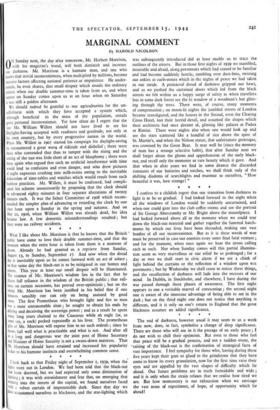I confess to a childish regret that our transition from
darkness to light is to be so gradual. I had looked forward to the night when all the windows of London would be suddenly uncurtained, and when one could gaze into the club coffee rooms and see the portrait of Sir George Abercromby or Mr. Bright above the mantelpiece. I had looked forward above all to the moment when we could tear down the black-out material and gather together the funereal hatch- ments by which our lives have been shrouded, making one vast bonfire of all our inconvenience. But as it is these weeds of woe must be preserved in case our enemies essay some final fatal venture ; and for the moment, when once again we hear the sirens calling each to each. Nor when Sunday comes will this partial illumina- tion seem so very marvellous or our relief be so prolonged ; for a day or two we shall start in civic alarm if we see a chink of light behind the curtains or the reflection of a window upon wet pavements ; but by Wednesday we shall cease to notice these things, and the recollection of darkness will fade into the recesses of our mind. In Dublin, in Stockholm, and elsewhere, I have during the war passed through these phases of awareness. The first night appears to one a veritable marvel of coruscation ; the second night one is aware of the immense advantage of being able to see in the dark ; but on the third night one does not notice that anything is different, and it is only on one's return to England that the great blackness assumes an added significance.
* * *






















 Previous page
Previous page